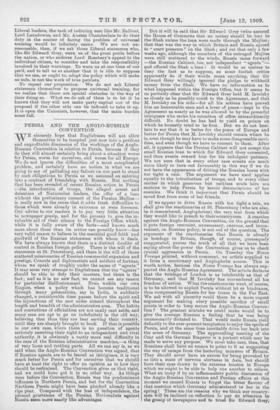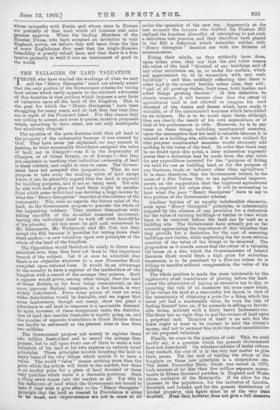PERSIA AND THE ANGLO-RUSSIAN CONVENTION.
WE sincerely hope that Englishmen will not allow themselves to be tempted just now into a perilous and unprofitable discussion of the workings of the Anglo- Russian Convention in relation to Persia, 'because if they do they will almost certainly bring about a situation worse for Persia, worse for ourselves, and worse for all Europe. We do not ignore the difficulties of a most complicated problem, and certainly have no notion in what we are going to say of palliating any failure on our part to stand by such obligations to Persia as we assumed on entering into a contract of friendship with Russia. But nothing that has been revealed of recent Russian action in Persia —the introduction of troops, the alleged arrest and detention of Nationalist leaders, the offer of a loan without the preliminary consent of the Persian Mejliss- is really new in the sense that it adds fresh difficulties to those which were already in existence or were foreseen. Our advice to our readers is to pay very little attention to newspaper gossip, and for the present to give the in- valuable aid of their silence to the Foreign Office, which, while it is fully aware of the facts—and knows much more about them than its critics can possibly know—has very valid reason to believe in the essential good faith and goodwill of the Russian statesmen with whom it deals. We have always known that there is a distinct duality of control in Russian foreign policy. There is the will of the statesmen at St. Petersburg, and there is the will of those scattered missionaries of Russian commercial expansion and prestige, Consuls and diplomatists and soldiers of fortune, whom we speak of roughly under the name of "agents." It may seem very strange to Englishmen that the "agents" should. be able to defy their masters, but there is the fact ; and as it is no new fact, we cannot see any reason for particular disillusionment. Even within our own Empire, when a policy which has become traditional through many generations, say in India, is suddenly changed, a considerable time passes before the spirit and the injunctions of the new order extend throughout the length and breadth of the administrative area. The habits and convictions of officialdom are not easily cast aside, and many men are apt to go on indefinitely in the old way, believing that thus they are best serving their country, until they are sharply brought to book. If that is possible in our own case, where there is no question of agents seriously asserting their right to an independent and rival authority, it is obviously a vastly more real difficulty in the case of the Russian administrative machine,—a thing of very loose and rattling parts. All we can say is, as we said When the Anglo-Russian Convention Was signed, that if Russian agents are to be feared as intriguers, it is very much better for Persia. and for ourselves that we should have at least the right to offer an opinion as to how they should be restrained. The Convention gives us that right, and we could have got it in no other way. As things were before the Convention, Russia was the predominant influence in Northern Persia, and but for the Convention Northern Persia might have been plucked already like a ripe pear. Compared with the loss of independence, the present grievances of the Persian Nationalists against Masta stem inOre neatly like advantages. But it will be said that Sir Edward Grey twice assured the House of Commons that no money should be lent to the Shah unless the loan were made through the Mejliss ; that that was the way in which Britain and Russia agreed. to "exert pressure" on the Shah ; and yet that only a few weeks ago, although the members of the outraged Mejliss were still scattered to the winds, Russia came forward —the Russian Cabinet, too, not independent "agents "- and offered the Shah a loan! It would be as useless to deny the fact as to suppose, as some foolish critics apparently do if their words mean anything, that Sir Edward Grey willingly ignored the pledge to withhold money from the Shah. We have no information as to what happened within the Foreign Office, but it seems to us perfectly clear that Sir Edward Grey held M. Isvolsky as closely as he possibly could to the Agreement, and that M. Isvolsky on his side—for all his actions have proved him an honourable man and a lover of peace—kept to the Agreement as nearly as he was allowed to by the powerful intriguers who make his retention of office extraordinarily difficult. No doubt he has had to yield on points on which he honestly tried to be firm. But we do not hesi- tate to say that it is better for the peace of Europe and better for Persia that M. Isvolsky should remain where he is, even though he may have to make some disagreeable sacri- fices, and even though we have to consent to them. After all, it appears that the Persian Cabinet will not accept the small Russian loan to which Sir Edward Grey consented, and thus events reward him for his indulgent patience. We are sure that in every other case events are much more likely to turn out favourably in this way if we do not have the appearance of driving the Russian horse with too tight a rein. The argument we have used applies equally to the introduction of troops, and to every other matter in which generous but reckless souls here are anxious to help Persia by heroic denunciations of her enemies. We think it important that Persia should be saved first from some of her friends.
If we appear to drive Russia with too tight a rein, we shall give the reactionaries at St. Petersburg (who are also, be it remembered, Anglophobes) the very text from which they would like to preach to their countrymen. A reaction against the Anglo-Russian Convention, on the ground that it puts foreign restraint, unnecessary, onerous, and incon- venient, on Russian policy, is not out of the question. The argument of the reactionaries that Russia is already in bondage to Britain, though, of course, grotesquely exaggerated, proves the truth of all that we have been saying about the power the Convention gives us to check cynical aggression in Persia. On Tuesday the Novoe Vremya printed, without comment, an article supplied to it from a reactionary and Anglophobe source. This is worth notice, because the Novoe Vremya has always sup- ported the Anglo-Russian Agreement. The article declares that the tutelage of London is as intolerable as that of Germany, and that M. Isvolsky has surrendered all his freedom of action. What the reactionaries want, of course, is to be allowed to exploit Persia without let or hindrance, thus compensating Russia for her losses in the Far East. We ask with all sincerity could there be a more cogent argument for making every possible sacrifice of small points in order to keep secure the Anglo-Russian Conven- tion? The greatest mistake we could make would be to give the average Russian a feeling that he was being unnecessarily dictated to. That would make Russia yield defiantly to the ever-present temptation to enjoy the spoils of Persia, and at the same time inevitably drive her back into the arms of Germany. The approaching meeting of the Czar and the German Emperor is a portent which may be made to serve any purpose. We must take care, then, that Russians shall have no reason to point to it as suggesting the way of escape from the hectoring manners of Britain. They should never have an excuse for being provoked by us into a. state of nervons alertness in Asia, but should have their eyes drawn to the extreme tension in Europe which we ought to be able to help one another to relieve. What an irony if by an inflammatory public discussion of the Anglo-Russian Convention and Persian affairs at this riiontient we caused Russia to forget the bitter flavour of that coercion which Germany administered to her in the spring ! These are the reasons why we think our country- men will be inclined on reflection to pay no attention lait the gossip of newspapers and to trust Sir Edward GTE% tvhose sympathy with Persia and whose aims in Europe are precisely of that kind which all humane and sane persons approve. When the leading Members of the Russian Duma, who have accepted an invitation to visit England, arrive, we believe they will learn from the lips of every Englishman they meet that the Anglo-Russian friendship is greatly valued here, and that there is a firm resolve patiently to weld it into an instrument of good in the world.











































 Previous page
Previous page